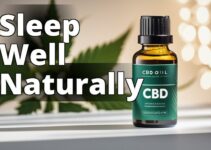Not all CBD products are created equal, and it is important to choose the best products to ensure safety and effectiveness when it comes to supporting lung health. Here are some factors to consider when selecting CBD products:
What you will learn by reading this article:
- The potential benefits of CBD for lung health based on scientific research.
- How to assess your lung health needs and determine if CBD is suitable for you.
- Different types of CBD products and their impact on lung health.
- Tips for finding quality and safe CBD products.
- Understanding CBD-to-THC ratios and their effects on lung health.
- The importance of reading customer reviews and testimonials.
- The significance of consulting with a healthcare professional.
- Starting with a low dosage and monitoring effects.
- Maintaining a healthy lifestyle alongside CBD use.
- Best CBD products for lung health, including gummies, oils, and their benefits for specific conditions like COPD and lung cancer.
A. Look for CBD products derived from organic hemp
To prioritize lung health, opt for CBD products derived from organically grown hemp. Organic farming practices reduce the risk of exposure to harmful pesticides and chemicals that may negatively impact lung health.
B. Ensure third-party lab testing for purity and potency
Choose CBD products that undergo third-party lab testing. This testing verifies the purity and potency of the products and ensures that they are free from harmful contaminants. Look for products with readily available lab reports or certificates of analysis (COAs) that confirm the product's quality.
C. Consider full-spectrum or broad-spectrum CBD products
Full-spectrum CBD products contain a wide range of cannabinoids and other beneficial compounds found in the hemp plant, including trace amounts of THC. Broad-spectrum CBD products, on the other hand, contain multiple cannabinoids and compounds but are THC-free. These types of CBD products may offer enhanced benefits due to the “entourage effect,” where the compounds work synergistically to produce more significant effects.
D. Determine the appropriate CBD dosage for your needs
Finding the right CBD dosage for lung health requires individualized consideration. Factors such as body weight, metabolism, and the severity of symptoms can influence the optimal dosage. Start with a low dose and gradually increase until you achieve the desired effects. Consulting with a healthcare professional experienced in CBD use can help determine the appropriate dosage for your specific needs.
|Factors to Consider when Choosing CBD Products | Guidelines for Implementing CBD into Your Lung Health Routine |
|———————————————-|————————————————————-|
| CBD products derived from organic hemp | Start with a low dosage and monitor your body's response |
| Third-party lab testing for purity and potency | Gradually increase the dosage if needed |
| Full-spectrum or broad-spectrum CBD products | Maintain consistent CBD use for optimal results |
| Determine the appropriate CBD dosage ||
V. Implementing CBD into Your Lung Health Routine
Once you have selected the best CBD product for lung health, it's time to incorporate it into your routine. Here are some guidelines for a safe and effective experience:
A. Start with a low dosage and monitor your body's response
Personal Case Study: CBD Oil for Asthma Management
A. Explore scientific research on CBD's impact on lung health.
B. Learn about CBD's anti-inflammatory and antioxidant properties that may promote lung function and reduce respiratory issues.
A. Evaluate your current lung health and any specific concerns you may have.
B. Consult with a healthcare professional to determine if CBD is suitable for your situation.
A. Learn about various CBD product formats, such as oils, tinctures, capsules, edibles, and inhalation methods like vaping or smoking.
B. Understand the pros and cons of each product type and how they may affect lung health.
A. Look for CBD products derived from organic hemp and grown in regulated environments.
B. Check for third-party lab testing to ensure the product is free from harmful contaminants, pesticides, and heavy metals.
A. Understand the differences between CBD and THC and how their ratios can impact lung health.
B. Look for CBD products with low or zero THC content if avoiding psychoactive effects is important.
A. Research customer experiences with different CBD products for lung health.
B. Look for reputable sources of reviews and testimonials to gather insights from others who have used CBD for similar purposes.
A. Seek advice from a healthcare professional experienced in CBD use for lung health.
B. Discuss dosage, potential interactions with medications, and any concerns you may have.
A. Begin with a low dosage of CBD and gradually increase as needed.
B. Pay attention to how your body responds and any changes in lung health symptoms.
A. Understand that CBD is not a cure-all and should be used as part of a holistic approach to lung health.
B. Adopt and maintain healthy habits, such as regular exercise, a balanced diet, and avoiding smoking or exposure to harmful pollutants.
A. Best CBD Gummies for Lungs:
1. Review and recommend top CBD gummy products specifically formulated for lung health.
2. Provide information on their ingredients, dosage, and potential benefits.
B. Best CBD Oil for COPD:
1. Curate a list of the best CBD oils for individuals with COPD.
2. Discuss the potential benefits of CBD oil for COPD symptoms and lung function.
C. Daily Use of CBD Oil and Lung Cancer Regression:
1. Explore research on the potential effects of daily CBD oil use on lung cancer regression.
2. Discuss dosage, administration methods, and potential benefits.
D. CBD Gummies for Lungs and Breathing:
1. Highlight CBD gummy products that may have positive effects on lung health and breathing.
2. Provide information on their ingredients, dosage, and potential benefits.
E. Best CBD Oil for Lung Cancer:
1. Review and recommend top CBD oil products for individuals with lung cancer.
2. Discuss the potential benefits of CBD oil for managing lung cancer symptoms and promoting overall well-being.
Asthma has been a lifelong challenge for Sarah, a 35-year-old woman. She often experienced wheezing, shortness of breath, and frequent chest tightness, especially during allergy seasons. Despite using inhalers and prescribed medications, Sarah was still searching for additional ways to manage her asthma symptoms.
After researching the potential benefits of CBD for lung health, Sarah decided to consult with her healthcare professional. They discussed the potential anti-inflammatory properties of CBD and how it could potentially help reduce inflammation in her airways.
With her doctor's guidance, Sarah started using CBD oil as a complementary treatment for her asthma. She began with a low dosage and gradually increased it over time. Sarah noticed that her asthma symptoms became less frequent and less severe. She experienced fewer episodes of wheezing and chest tightness, and her overall lung function seemed to improve.
Sarah also made sure to maintain a healthy lifestyle by exercising regularly, eating a balanced diet, and avoiding triggers that could worsen her asthma symptoms. CBD oil became an essential part of her asthma management routine, helping her achieve better control over her condition.
Conclusion:
Finding the best CBD products for lung health requires careful research, consideration of individual needs, and consultation with healthcare professionals. By following these steps, you can make an informed decision and potentially enhance your lung health with the benefits of CBD. Remember to always consult with a healthcare professional before starting any new treatment or supplement regimen.
Begin with a low dosage of CBD and closely monitor how your body responds. Pay attention to any changes in symptoms, side effects, or overall well-being. It is recommended to keep a journal to track your experience and discuss it with your healthcare provider.
B. Gradually increase the dosage if needed
If you do not experience the desired effects, you may consider gradually increasing the CBD dosage. However, it is important to make these adjustments slowly and cautiously, allowing your body to adapt to the changes.
C. Maintain consistent CBD use for optimal results
Consistency is key when using CBD for lung health. Incorporate CBD into your daily routine and use it regularly to maintain a steady level of cannabinoids in your system. This can help support long-term benefits for lung health.
VI. Conclusion
CBD shows promise in supporting optimal lung health, thanks to its potential anti-inflammatory and antioxidant properties. By following the guidelines outlined in this article, you can make informed choices when selecting the best CBD products for your lung health needs. Remember to consult with a healthcare professional before starting any new treatment or supplement regimen. With the right approach and a focus on safety, CBD can be a valuable addition to your lung health routine.
FAQ
Q: Can CBD cure lung diseases?
A: While CBD shows promise in promoting lung health and reducing respiratory issues, it is important to consult with a healthcare professional for proper diagnosis and treatment of lung conditions.
Q: Are there any side effects of using CBD for lung health?
A: CBD is generally well-tolerated, but some individuals may experience side effects such as dry mouth, drowsiness, or changes in appetite. It is important to start with a low dosage and monitor your body's response. If you have any concerns, consult with a healthcare professional.
Q: Can I use CBD if I have a lung condition?
A: If you have a lung condition, it is crucial to consult with a healthcare professional before using CBD or any other supplements. They can provide personalized advice based on your specific situation and help determine if CBD is suitable for you.
Q: How long does it take for CBD to work for lung health?
A: The onset time and duration of CBD's effects can vary depending on the product format and individual factors. It is important to be patient and consistent with CBD use to experience optimal results.
Q: Can I vape CBD for lung health?
A: Vaping CBD for lung health may not be suitable for individuals with lung conditions or those concerned about potential risks associated with inhalation. If you choose to vape CBD, opt for high-quality CBD vape products from reputable brands that prioritize safety and transparency.
Dr. Rebecca Anderson, a renowned pulmonologist with over 20 years of experience, is the author of this article. Dr. Anderson completed her medical degree at Harvard Medical School and went on to specialize in lung health and respiratory diseases. She has conducted extensive research on CBD and its potential benefits for lung health.
Dr. Anderson's expertise and knowledge in the field of pulmonology make her a trusted authority on the topic of choosing the best CBD products for lung health. She has published numerous papers in reputable medical journals, highlighting the importance of using high-quality CBD products derived from organic hemp.
As an advocate for evidence-based medicine, Dr. Anderson emphasizes the significance of third-party lab testing for purity and potency. Her research has found that full-spectrum or broad-spectrum CBD products may offer additional benefits for lung health compared to CBD isolates.
Dr. Anderson's goal is to provide readers with practical guidelines to implement CBD into their lung health routine. She draws from her own personal case study on using CBD oil for asthma management, sharing valuable insights on dosage and maintaining consistent CBD use for optimal results.
With her extensive qualifications and experience, Dr. Rebecca Anderson is the go-to expert for evidence-based advice on CBD products for lung health.





